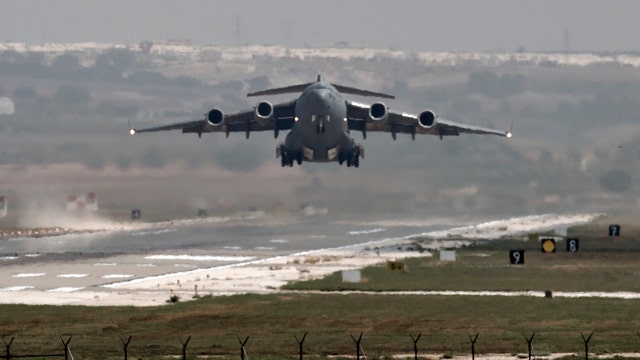Turkey strikes ISIS, agrees to let US use airbase
Gen. Jack Keane explains significance of move
ANKARA, Turkey – Turkish jets struck camps belonging to Kurdish militants in northern Iraq, authorities said Saturday, the first strike since a peace deal was announced in 2013, as Ankara also bombed Islamic State positions in Syria for a second straight night.
The strikes in Iraq targeted the Kurdistan Workers' Party, or PKK, whose affiliates have been effective in battling the Islamic State group. The strikes further complicate the U.S.-led war against the extremists, which has relied on Kurdish forces making gains in both Iraq and Syria.
A spokesman in Iraq for the PKK, which has been fighting Turkey for autonomy since 1984 and is considered a terrorist organization by Ankara and its allies, said the strikes likely spelled the end of the peace agreement.
"Turkey has basically ended the cease-fire," Zagros Hiwa told The Associated Press, declining to elaborate further. He said the PKK was still assessing the damage caused by the strikes, though they didn't appear to cause casualties.
The jets hit PKK shelters, bunkers, caves, storages facilities and other "logistical points," a statement from the Turkish prime minister's office said. It said five areas were targeted, including the Qandil mountains, where the PKK's command is based. The statement did not specify Islamic State targets that were struck in Syria in a second night of bombings, but described the airstrikes in both Syria and Iraq as being "effective."
Hiwa said the jets struck villages on Qandil although the PKK base was not hit.
Turkey's military also shelled Islamic State and PKK positions in Syria from across the Turkish border, the government said. It vowed to press ahead with operations against the PKK and IS, saying it was "determined to take all steps to ensure peace and security for our people."
Turkish police meanwhile proceeded with a major operation against the Islamic State, the PKK and the far-left DHKP-C for a second day running. More than 300 people were detained in raids in Istanbul and 21 provinces, the government statement said.
Tensions have flared with Kurds in recent days after an Islamic State suicide bombing in the southeastern Turkish city of Suruc on Monday killed 32 people. Kurdish groups held the Turkish government responsible for the blast, saying it had not been aggressive in battling the Islamic State group.
On Wednesday, the PKK claimed responsibility for the killing of two Turkish police officers near the Kurdish majority city of Sanliurfa, near the Syrian border.
In other attacks, seven police officers were wounded after suspected PKK militants hurled a small bomb at a police station in the town of Bismil, near the mainly Kurdish city of Diyarbakir, the Dogan news agency reported Friday. Assailants also hurled a small bomb at officers inside a police vehicle in the town of Semdinli, near the border with Iraq, the agency said.
Kurdish rebels also kidnapped a police officer in Lice, the state-run Anadolu Agency reported. Another group of rebels raided a privately owned thermal power plant near the Iraqi border, destroying vehicles and abducting 15 workers, Dogan reported.
Turkey started attacking Islamic State positions after the suicide bombing and an extremist ambush that killed a Turkish soldier.
On Friday, three F-16 jets struck Islamic State targets that included two command centers and a gathering point near the Turkish border in Syria. The Syrian Observatory for Human Rights said nine Islamic State militants were killed in the raids. The extremists have yet to comment on the strikes.
Turkey also announced Friday that it was allowing its air bases to be used by the U.S.-led coalition forces for operations against Islamic State extremists. Turkey until now had been reluctant to take part in U.S.-led coalition airstrikes against the Islamic State group.

